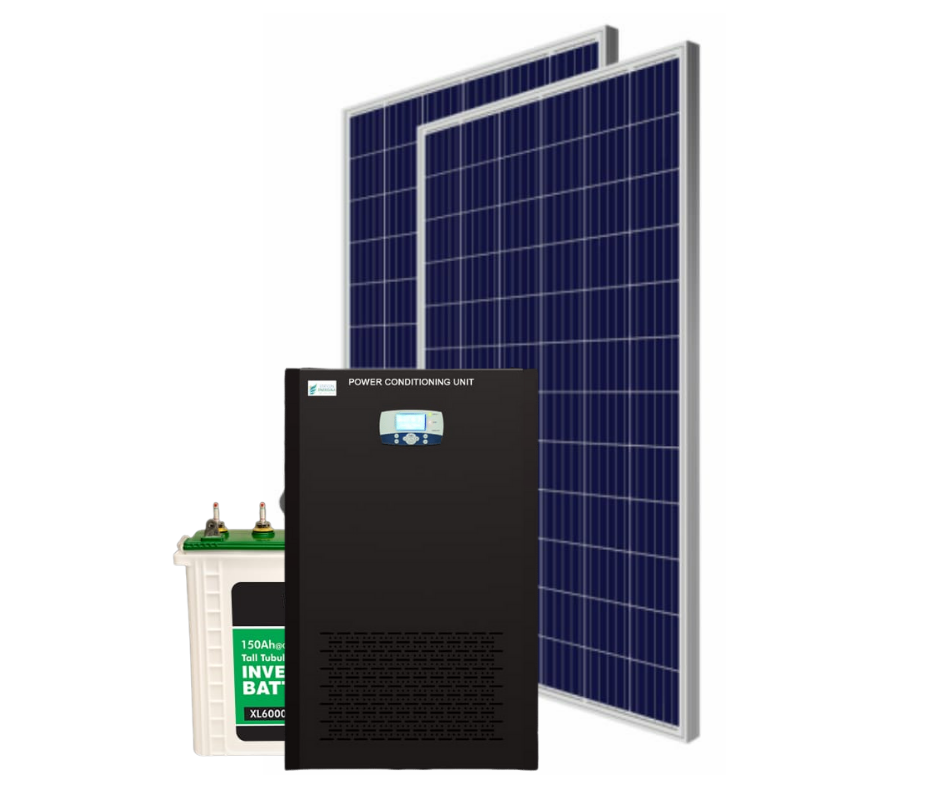Off-Grid System

Off Grid
Off-grid solar refers to solar power systems that are designed to operate independently of the electrical grid. These systems typically consist of solar panels, batteries for energy storage, charge controllers, and inverters. Here’s a breakdown of how they work:
Solar Panels: Photovoltaic (PV) solar panels capture sunlight and convert it into electricity. The size and number of panels depend on the energy needs of the off-grid system.
Charge Controller: A charge controller regulates the voltage and current from the solar panels to the batteries. It prevents overcharging and ensures the batteries are charged efficiently.
Batteries: Energy storage is crucial in off-grid solar systems because it allows for electricity use when the sun isn’t shining (like at night or during cloudy weather). Deep-cycle batteries, such as lead-acid or lithium-ion batteries, store the excess electricity generated by the solar panels.
Inverter: Solar panels generate direct current (DC) electricity, while most household appliances use alternating current (AC). An inverter converts DC electricity from the batteries into AC electricity that can power standard appliances and electronics.
Backup Generator (Optional): Some off-grid systems include a backup generator, typically diesel or propane-powered, to provide additional power during extended periods of low sunlight or high energy demand.
Off-grid solar systems require careful planning to ensure they can meet the energy needs of the household or facility reliably throughout the year. Factors such as location, energy consumption patterns, and weather conditions play a significant role in system design and sizing.
Stay Independent
Send me a message to discuss your needs. I always reply within 24 hours.
FAQ ABOUT OFF-GRID SOLAR SYSTEM
What is an off-grid solar system?
An off-grid solar system is a solar power system that operates independently of the public electricity grid. It generates electricity from solar panels, stores it in batteries, and supplies power to your home or business without needing to connect to the utility grid. Off-grid systems are ideal for remote locations where grid access is unavailable or unreliable.
What are the benefits of an off-grid solar system?
- Independence from the grid: You won’t rely on the utility grid for electricity, making it ideal for remote locations.
- Energy security: Off-grid systems provide reliable power even during grid outages.
- Cost savings: You can avoid high grid electricity costs, especially in remote areas with high energy prices.
- Sustainable energy source: Solar energy is renewable and environmentally friendly, helping reduce your carbon footprint.
What do I need for an off-grid solar system?
An off-grid solar system typically includes:
- Solar panels to capture sunlight and generate electricity.
- Batteries to store excess energy for use at night or on cloudy days.
- Inverter to convert DC power to AC power.
- Charge controller to regulate the charging of the batteries and prevent overcharging.
- Wiring and mounting hardware to install the system properly.
How much does an off-grid solar system cost?
The cost of an off-grid solar system varies based on the size of the system, the number of solar panels, battery capacity, and other factors like installation complexity. On average, an off-grid system can starts 68000 or more for a typical home, but costs can vary significantly based on location, energy needs, and equipment choices. We offer a customized quote based on your specific requirements.
Can I still use appliances like refrigerators and air conditioners with an off-grid system?
.Yes, an off-grid system can power appliances such as refrigerators, lighting, fans, and other devices. However, energy-intensive appliances like air conditioners, electric heaters, and large water pumps may require a larger solar system with a bigger battery bank and higher solar panel capacity. We can assess your power needs and design a system that can handle your specific appliances.
How do I get started with an off-grid solar system?
To get started, simply contact SURYA TRADERS, for a free consultation. Our team will assess your energy needs, evaluate your location, and design a customized off-grid solar system tailored to your specific requirements. We will handle everything from system design and installation to system maintenance, ensuring a seamless transition to solar power.
